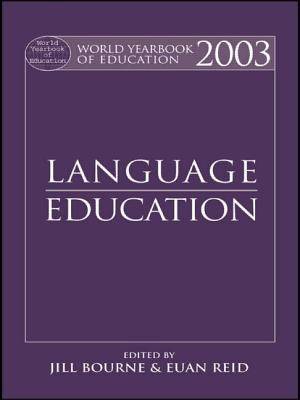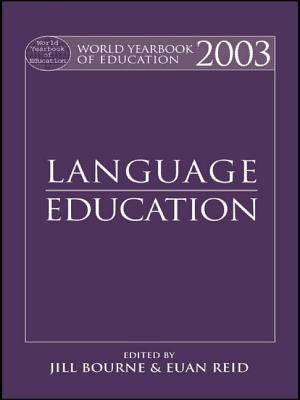
- Afhalen na 1 uur in een winkel met voorraad
- Gratis thuislevering in België vanaf € 30
- Ruim aanbod met 7 miljoen producten
- Afhalen na 1 uur in een winkel met voorraad
- Gratis thuislevering in België vanaf € 30
- Ruim aanbod met 7 miljoen producten
Zoeken
World Yearbook of Education 2003
Language Education
€ 68,95
+ 137 punten
Omschrijving
The issues raised by the role of language in education are some of the most important and contentious faced by education systems across the globe. Language is embedded in the concepts of nationhood and identity, and is therefore directly linked to the very social and political fabric of a country.
In a climate of increasing globalisation, development and mobility of populations, nations around the world are concerned with the tension between cultivating a sense of cultural and linguistic cohesion and making use of the linguistic diversity that exists in every country and region. This book examines the implications and impacts, the dilemmas and potential for language education in relation to education systems and wider society.
Split into three key parts, it considers:
*current issues in language education, including the role of language in maintaining power and inequalities, in encouraging participation and inclusion and in challenging the status quo;
*different approaches to language education around the world;
*the potential for language to provide opportunities for the disadvantaged, illustrated by case studies of three cities.
This recent volume of the internationally respected World Yearbook of Education continues the tradition of offering a wide range of international perspectives from leading commentators on a universal concern. The material amassed here will be essential reading for teacher educators, education researchers and school leaders across the world.
In a climate of increasing globalisation, development and mobility of populations, nations around the world are concerned with the tension between cultivating a sense of cultural and linguistic cohesion and making use of the linguistic diversity that exists in every country and region. This book examines the implications and impacts, the dilemmas and potential for language education in relation to education systems and wider society.
Split into three key parts, it considers:
*current issues in language education, including the role of language in maintaining power and inequalities, in encouraging participation and inclusion and in challenging the status quo;
*different approaches to language education around the world;
*the potential for language to provide opportunities for the disadvantaged, illustrated by case studies of three cities.
This recent volume of the internationally respected World Yearbook of Education continues the tradition of offering a wide range of international perspectives from leading commentators on a universal concern. The material amassed here will be essential reading for teacher educators, education researchers and school leaders across the world.
Specificaties
Betrokkenen
- Uitgeverij:
Inhoud
- Aantal bladzijden:
- 334
- Taal:
- Engels
- Reeks:
Eigenschappen
- Productcode (EAN):
- 9780415501132
- Verschijningsdatum:
- 6/05/2012
- Uitvoering:
- Paperback
- Formaat:
- Trade paperback (VS)
- Afmetingen:
- 156 mm x 234 mm
- Gewicht:
- 471 g

Alleen bij Standaard Boekhandel
+ 137 punten op je klantenkaart van Standaard Boekhandel
Beoordelingen
We publiceren alleen reviews die voldoen aan de voorwaarden voor reviews. Bekijk onze voorwaarden voor reviews.







